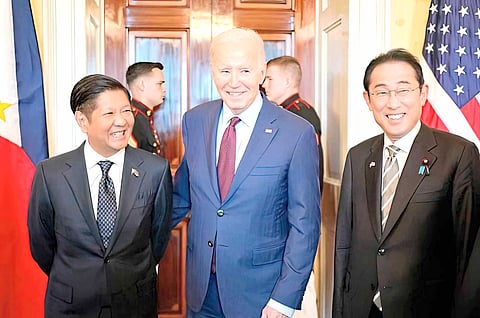
- NEWS
- the EDIT
- COMMENTARY
- BUSINESS
- LIFE
- SHOW
- ACTION
- GLOBAL GOALS
- SNAPS
- DYARYO TIRADA
- MORE

The leaders of the United States, Japan, and the Philippines said on Thursday (US time) that they will “strongly” oppose China’s attempts to change the status quo in the Indo-Pacific region by force or coercion.
President Joe Biden, Japanese Prime Minister Fumio Kishida, and President Ferdinand Marcos Jr. issued the joint vision statement, which was posted on the White House website, as their trilateral summit in Washington, D.C., concluded.
The leaders expressed their “serious” concern about China’s “dangerous and aggressive” actions in the South China Sea.
“We express our serious concerns about the People’s Republic of China’s dangerous and aggressive behavior in the South China Sea. We are also concerned by the militarization of reclaimed features and unlawful maritime claims in the South China Sea,” they said.
“We steadfastly oppose the dangerous and coercive use of Coast Guard and maritime militia vessels in the South China Sea, as well as efforts to disrupt other countries’ offshore resource exploitation,” they added.
The leaders also urged China to follow the “final and legally binding” 2016 decision of the arbitral court, which ruled that Second Thomas Shoal (Ayungin Shoal) is part of the Philippines’ exclusive economic zone.
The latest incident involving the China Coast Guard at Ayungin Shoal happened on 23 March. The CCG used a water cannon on a Philippine resupply boat, bringing supplies to the BRP Sierra Madre, which was grounded on the shoal.
Peace with Taiwan
The three leaders also urged a peaceful end to the conflict between China and Taiwan.
“We affirm the importance of peace and stability across the Taiwan Strait as an indispensable element of global security and prosperity, recognize that there is no change in our basic positions on Taiwan, and call for a peaceful resolution of cross-strait issues,” the statement read.
On the conflict between Japan and China, they said, “We express our serious concerns regarding the situation in the East China Sea and reiterate our strong opposition to any attempts by the PRC to unilaterally change the status quo by force or coercion in the East China Sea, including through actions that seek to undermine Japan’s longstanding and peaceful administration of the Senkaku Islands.”
Biden’s warning
Biden issued a bold warning that any attack on Philippine vessels or forces in the South China Sea would activate the US-Philippines Mutual Defense Treaty.
Before meeting with President Marcos and Prime Minister Kishida at the White House, Biden reiterated the United States’ “ironclad” defense commitments to Japan and the Philippines.
“As I said before, any attack on Philippine aircraft, vessels, or armed forces in the South China Sea would invoke our mutual defense treaty,” Biden said in a video posted on the c-span.org website.
“We are deepening our maritime and security ties. This is something I know you’ve discussed with Vice President Harris during her travels to the Indo-Pacific,” he told Marcos.
Marcos, for his part, emphasized the strong foundation of the partnership, built on “a shared vision in pursuit of a peaceful, stable and prosperous Indo-Pacific.”
“We meet today as friends and partners bound by a shared vision in pursuit of a peaceful, stable, and prosperous Indo-Pacific,” he said.
He highlighted the importance of democracy, good governance, and the rule of law while pointing to the numerous preparatory meetings and joint exercises that led to the historic summit.
yIn the same joint vision statement, the leaders condemned North Korea’s recent ballistic missile launches as they committed to completely denuclearizing the Korean Peninsula.
In particular, the three countries called North Korea’s actions “escalatory threats and a grave threat to peace and security.”
The leaders condemned not just the launches but also North Korea’s “unprecedented number” of intercontinental ballistic missiles (ICBMs), which could reach the US mainland.
“Our three nations affirm our commitment to the complete denuclearization of the Korean Peninsula and strongly condemn the Democratic People’s Republic of Korea’s (DPRK) escalatory threats and unprecedented number of ballistic missile launches, including multiple intercontinental ballistic missile launches, which pose a grave threat to peace and security,” the statement said.
“We strongly condemn these escalatory threats and call on North Korea to comply with relevant (United Nations) Security Council resolutions.”
The leaders also highlighted the ongoing humanitarian concerns surrounding North Korea’s nuclear program as they stressed the importance of addressing these issues.
“We emphasize the need to resolve the abductions issue and address the human rights concerns of the international community,” the statement said.
Ukraine, too
Aside from the current situation in the Korean Peninsula, the leaders expressed solidarity with Ukraine in the face of Russia’s invasion.
They particularly reiterated their unwavering support of Ukraine’s sovereignty, independence, and territorial integrity.
The statement condemned Russia’s threat to use nuclear weapons, calling it “unacceptable” and stating that “any use of a nuclear weapon by Russia in Ukraine would be completely unjustifiable.”
“We reaffirm our joint pursuit of a world without nuclear weapons,” the statement said.
